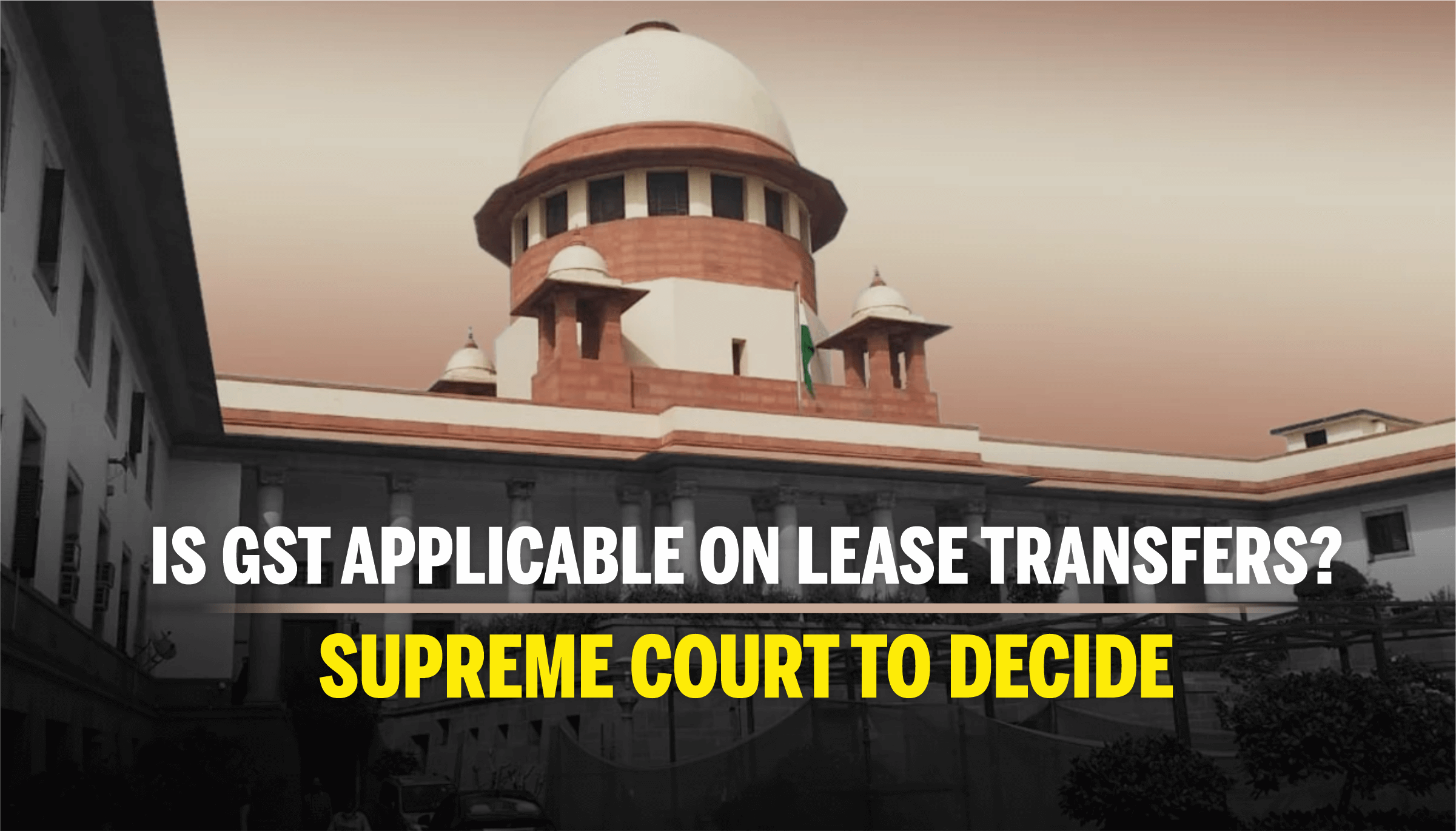Is GST Applicable on Lease Transfers? SC to Decide

In a major development for the real estate and infrastructure sectors, the Supreme Court of India has initiated a consolidated hearing on a critical legal question – whether the transfer of leasehold rights amounts to a “supply” under GST and is thus liable to tax. This decision stems from the clubbing of multiple petitions, including the Union’s challenge to the Gujarat High Court’s verdict in Alfa Tools Pvt. Ltd. and Gujarat Chamber of Commerce and Industry, which had ruled in favour of assessees.
This issue has long vexed businesses engaged in long-term leasehold transactions, particularly in industrial, commercial, and infrastructure contexts. The Supreme Court’s final decision is likely to have far-reaching implications not only for taxpayers but also for tax administration across India.
The Legal Timeline: Key Cases That Shaped the Issue
The dispute traces back to divergent views taken by High Courts on whether the assignment or transfer of leasehold rights in land or immovable property attracts GST.
Gujarat High Court – Alfa Tools Pvt. Ltd. (2024)
In this landmark case, the Gujarat High Court held that the assignment of leasehold rights for a premium consideration does not constitute “supply” under Section 7 of the CGST Act. The Court emphasized that such transactions fall under Entry 5 of Schedule III, which excludes “sale of land and, subject to clause (b) of paragraph 5 of Schedule II, sale of building” from the ambit of supply. The Court ruled that the transfer of a right akin to ownership through long-term lease (typically 99 years) is a transfer of immovable property.
Additionally, the Gujarat HC quashed the show-cause notice issued by the department, holding it to be barred by limitation under Section 73(10) of the CGST Act.
Gujarat Chamber of Commerce & Industry Case
In another case involving similar facts, the Gujarat High Court reiterated its stance, asserting that a leasehold right—especially of 90+ years—is functionally equivalent to ownership, and hence outside the GST net. The Court also criticised the Department’s attempt to stretch the meaning of “services” to rope in what is essentially an immovable property transaction.
Bombay High Court – Tokheim India Pvt. Ltd.
The Bombay High Court, too, has granted interim reliefs to petitioners challenging GST demands on assignment of leasehold rights. Although a final ruling is pending, the Court signalled that the issue involves substantial questions of law, meriting adjudication by the Supreme Court.
The Legal Core: What Does GST Law Say?
At the heart of the issue lies the interpretation of “supply” under GST law and its interaction with the Transfer of Property Act and the Registration Act.
1. Definition of “Supply”
As per Section 7 of the CGST Act, “supply” includes sale, transfer, barter, exchange, license, rental, lease or disposal. However, Schedule III clearly carves out “sale of land” from this definition, making such transactions non-taxable under GST.
2. Transfer vs. Assignment
The tax authorities argue that leasehold assignments involve monetary consideration and do not transfer absolute title, and hence constitute a “supply of service.” However, courts have countered this by observing that long-term lease assignments effectively confer ownership rights and hence resemble a “deemed sale” of immovable property.
3. Legislative Intent
The exclusion of immovable property from GST’s scope was deliberate. Both the GST Council’s discussions and parliamentary debates acknowledged the need to keep such transactions within the domain of stamp duty and registration laws, not GST.
Implications if GST Is Held Applicable
Should the Supreme Court eventually uphold the Revenue’s stance, the consequences could be far-reaching:
-
Massive Retrospective Exposure: Taxpayers who assigned leasehold rights over the past six years may face retrospective GST demands, interest, and penalties.
-
Compliance Burden: Businesses, especially in industrial parks and SEZs, will need to re-evaluate old contracts, reassess tax positions, and possibly restructure future transactions.
-
Potential Refund Claims Barred: Those who voluntarily paid GST assuming such transfers were taxable may find refund claims complicated by the doctrine of unjust enrichment.
-
Litigation Surge: The decision would open the floodgates to hundreds of retrospective litigations and assessments.
Conclusion: Awaiting Judicial Finality
The Supreme Court’s decision to consolidate these petitions marks a critical turning point in GST jurisprudence on immovable property. Given the wide-ranging commercial and legal implications, the verdict will not just settle academic debate—it will shape the future of industrial leasing, public-private partnerships, and urban infrastructure development.
As the apex court prepares to adjudicate, businesses should review past lease transactions, assess potential exposures, and prepare to realign their tax positions based on the ruling.
The final word from the Supreme Court will provide much-needed legal certainty and settle a long-pending and contentious GST issue that lies at the intersection of indirect tax law and property rights.
